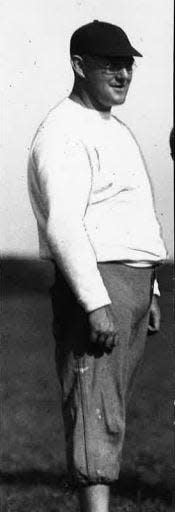Charlie Oliver turned Dartmouth High School into a legitimate football power in the 1930s
Editor's note: Spotlight is the theme for the latest installment in the Buddy’s Best series, which kicked off last year. Former athletes, coaches and pioneers are among the people who will be highlighted.
Any coach who subscribes to the old adage — “Winning isn’t everything; it’s the only thing” — either never knew or completely disagreed with Charlie Oliver.
For those who didn’t know him, Oliver was a brilliant and highly-successful high school football coach back in the 1930s and 40s who introduced the gridiron sport to Westport High School before turning Dartmouth High School into a perennial Narragansett League power.
Oliver was born in Avon, but moved to Brockton when he was five years old and later went on to author a three-year athletic career as an offensive football standout at Brockton High School. From 1918 through 1920, the 130-pounder was ranked among the finest two-way ends in Eastern Massachusetts.

His football talents earned him a scholarship to Massachusetts State College but a fractured leg in his freshman season ended his playing career. But Oliver’s passion for the sport continued to hold his interest in football and following 10 weeks of rehabilitation and walking with the aid of crutches, his mind was re-focused on the sport.
In 1922 Oliver earned the position of assistant manager for the school’s football team and the following season he was promoted to manager.
He didn’t catch a pass, make a tackle or recover a fumble, but Charlie drew closer to the team by charting plays and learning the finer points of a game he continued to love with a passion. It was just the incentive he needed to assemble the building blocks for what would become a rock-solid coaching career.
In the offseason, Oliver attended Lou Little’s Coaching School in Boston to sharpen up on the finer points of the game from a coaching legend who had won 150 games at Georgetown University.
Graduating from Massachusetts State, Oliver was hired to teach at Westport High School, where he established and taught an agricultural program. But Charlie found his way into the spotlight after convincing school principal Milton Earle to start a football program. With Oliver serving as head coach, Westport’s first football team made its debut in the fall of 1925.
Oliver remained at Westport as a teacher and head football coach for three more seasons before accepting a dual position at Dartmouth High School prior to the 1929-30 school year.
In addition to directing the school’s first agricultural program, Oliver agreed to become an assistant coach with the varsity team which was under the direction of Fred Armstrong who also was the school’s principal.
A year later, Oliver was named head coach, a position he held for 16 seasons, culminating with a State Class C Co-Championship in 1945.
Oliver’s won-lost record appears to be incomplete. His Dartmouth teams clearly won more than they lost . A lot more. Apparently even more than Charlie could appreciate.
Dartmouth was a member of the Narragansett League during the early portion of Oliver’s coaching reign and for five consecutive seasons the Green took home the championship trophy.
In his final season on the sidelines, Oliver’s team shared a divisional state championship with Stetson High School of Randolph.
Oliver was named assistant principal at the high school 1934 and, in 1937, was appointed principal when Stewart B. Atkinson resigned to become principal at Hingham High. Before, during and even after Atkinson’s resignation, Oliver managed his time well enough to keep his gridiron Green Machine running on all cylinders and on a steady course through the Narragansett League enroute to a series of championships. But Oliver felt a certain uneasiness over his domination of the Narry League and after consulting with then-principal Atkinson, Dartmouth decided to withdraw from the local circuit. In Atkinson’s words: “Because Dartmouth won too often and we (Dartmouth) wanted to give other schools a chance at a championship we have decided to withdraw from the Narragansett League.” Oliver agreed, adding: “If you (Dartmouth) never play anybody better than yourself, you will never get any better,” he was quoted as saying.
So, in the late 1930s, Dartmouth left the Narry League and began playing tougher teams like New Bedford High, New Bedford Vocational and Fairhaven on a regular basis.
Oliver resigned his position as school principal and head football coach following the championship run in 1945 to become an assistant professor of education in charge of agricultural teacher training at his alma mater Massachusetts State College. Prior to his departure, he was honored during a winter banquet ceremony following the 1945 championship season. A legion of former players were on hand to express their thanks and gratitude to the man who had helped them become outstanding young men and help turn Dartmouth High School into a legitimate football power.
This article originally appeared on Standard-Times: Charlie Oliver turned Dartmouth High into a football power in 1930s
